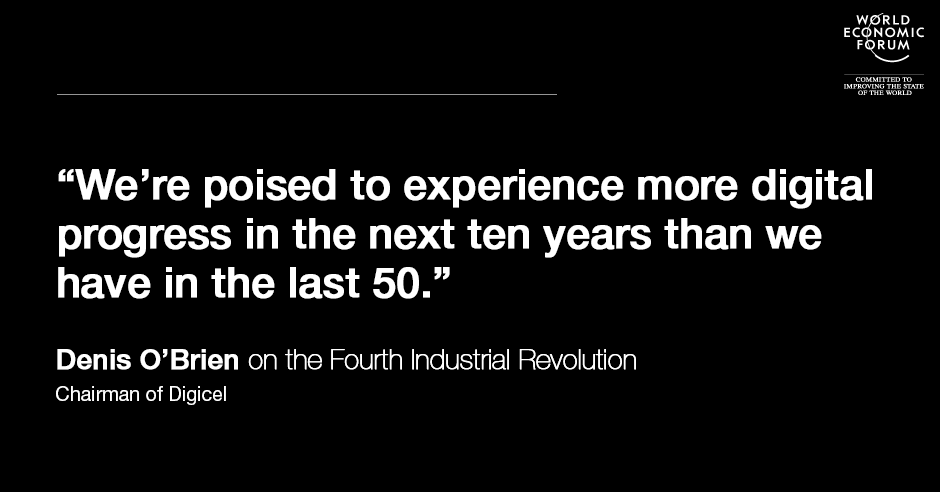How will the Fourth Industrial Revolution change the future of work?

Image: An engineer works on Surena 3 humanoid robot (R) next to Surena 2 robot, in a lab at Tehran University, Iran December 6, 2015. REUTERS/Raheb Homavandi

Get involved with our crowdsourced digital platform to deliver impact at scale
Stay up to date:
Davos Agenda
Later this week, CEOs, political leaders, social entrepreneurs, technologists and other global leaders will flock to Davos to further the World Economic Forum’s mission of improving the state of the world.
While the Forum’s mission has remained the same for more than four decades, we are confronting a more complex and incredibly interconnected world. As we enter the Fourth Industrial Revolution – a digital revolution expected to transform society – we have already seen massive technological changes begin to alter the nature of work, but this is just the beginning. We’re poised to experience more digital progress in the next ten years than we have in the last 50.

In many ways, these advances are propelling our society forward, yet they are also magnifying the gap between available and needed skills, and employers face the challenge of finding talent equipped with the know-how to succeed in a world of rapid innovation. So how do we close this gap? We need to invest in human capital by not only hiring the best, but also empowering our workforce – particularly women and those in local markets – to rise to senior leadership levels.
Global business, local focus
In today’s globalising business landscape, hiring the best people from around the world has become a top priority for leaders. Global organisations need to win in multiple local markets, and in order to do so, they need the local insights and capabilities of the people who were raised in those markets and are fully immersed in their cultures. Attracting and tapping the resources of the local talent pool can have a powerful impact on a global business. In fact, I’ve found that companies which provide local talent with the necessary support - as well as aspirational opportunities - are particularly successful at stimulating business growth in new and emerging markets.
While there is no one-size-fits-all strategy to successfully attracting and retaining local talent, a few companies have been doing it very well. For instance, German media giant Bertelsmann develops and retains top managers through a specialised CEO training program that brings local-market employees to the corporate centre, exposing them to a range of functional and geographical issues to prepare them for situations they may encounter themselves as leaders.
Goldman Sachs is also successfully building up local leadership through programmes designed to tackle cultural and linguistic barriers, which had been preventing local executives from taking jobs at the global level. In Japan, for example, Goldman Sachs’s programme helped local employees interact more comfortably and effectively with their counterparts around the world by focusing on the improvement of cross-cultural communication skills.
Having run a company operating in 32 markets in the Caribbean, Central America and Asia Pacific for nearly 15 years, I’ve seen firsthand the impact hiring local talent can have on not only a business, but the markets where it operates, and it is empowerment that is the key to success here.
Women and the Fourth Industrial Revolution
This notion of empowerment not only applies to local talent broadly, but also more specifically to women. The advancement of women has been a focus of corporations for more than 25 years, yet the ratio of women in top jobs has remained virtually unchanged, and, in some major organisations, early progress has given way to a stall or decline.
In fact, the World Economic Forum’s 2015 Global Gender Gap Report found there to be little improvement in equality for women in the workplace since 2006, marking a decade of stalled progress. Most shocking is the persistent absence of gender balance that has continued despite research showing the profitability of companies with gender-balanced senior teams outperforms the industry average by more than 34 percent. For these reasons, I applaud and admire UN Women’s HeForShe IMPACT 10x10x10 Initiative, which launched only a year ago, as it works to accelerate progress for women and empower younger generations with an awareness of gender inequality.
This is an area I feel especially passionate about. Six out of Digicel Group’s 23 CEOs are women from local markets and 45% of the total workforce worldwide is female. Their dedication and high levels of emotional intelligence have contributed significantly to the success we have had since the company’s inception in 2001.
Looking ahead to the next ten, 15 and even 20 years, business leaders will need to rely on a fully inspired and gender-balanced workforce, in which local-market employees feel empowered to take on senior leadership roles that will drive success in our ever-growing and ever-changing marketplace.
Author: Denis O’Brien is Chairman of Digicel. He is participating in the World Economic Forum’s Annual Meeting in Davos.
Don't miss any update on this topic
Create a free account and access your personalized content collection with our latest publications and analyses.
License and Republishing
World Economic Forum articles may be republished in accordance with the Creative Commons Attribution-NonCommercial-NoDerivatives 4.0 International Public License, and in accordance with our Terms of Use.
The views expressed in this article are those of the author alone and not the World Economic Forum.
The Agenda Weekly
A weekly update of the most important issues driving the global agenda
You can unsubscribe at any time using the link in our emails. For more details, review our privacy policy.
More on Davos AgendaSee all
Andrea Willige
March 27, 2024
Shyam Bishen
March 20, 2024
Simon Torkington
March 15, 2024
Miranda Barker
March 7, 2024
Robin Pomeroy
March 1, 2024






